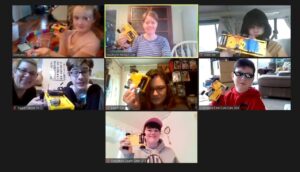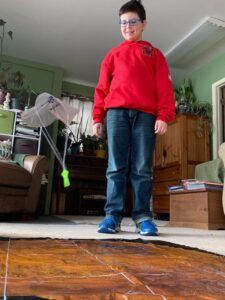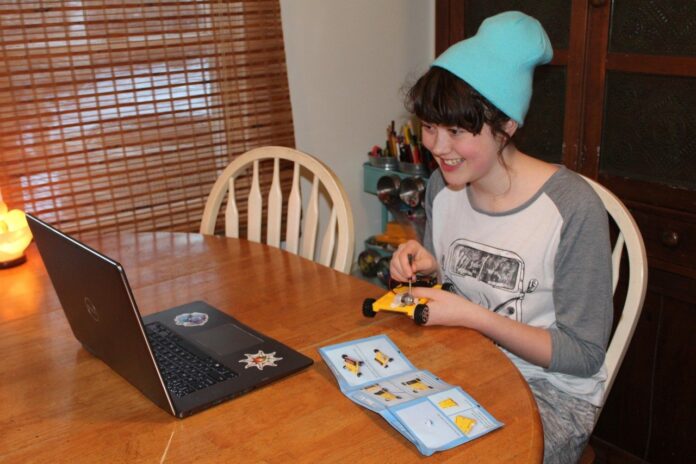As Emma Lloyd, a 13-year-old member of the Soaring Arrows 4-H Club in Frederick County, Virginia, watches NASA’s Perseverance Mars Rover barrel toward the red planet, she feels a special connection to the historic moment.
“Working on the 4-H Mars missions at the same time as NASA is inspiring,” Lloyd said. “I feel like I’m working alongside NASA to get to Mars. It makes me want to learn more about the red planet and NASA.”
Seizing the moment of NASA’s Mars rover launch last year, 4-Hers across the country took part in the Mars Base Camp Challenge, four unique hands-on activities to get kids and teens to explore computer science, space agriculture, and more. The rover is expected to touch down on the red dust of Mars on Feb. 18.
With support from Google, National 4-H Council, and Virginia Cooperative Extension, Virginia 4-H designed the challenge to ensure that young people everywhere, regardless of internet connectivity or family resources, have access to STEM Challenge kits, which include online and offline activities.
The kit contained the parts for the construction of a complex miniature Mars rover. Youth built a motorized rover that could navigate obstacles – ranging from blocks found around the house or even cardboard boxes – to simulate the topography of Mars.
“I’m getting more practice at not giving up or getting upset when something is hard or doesn’t work,” said Genevieve Harvey, 7, and member of the Soaring Arrows 4-H Club. “My rover was too fast at first and then it kept getting stuck or spinning. I had to keep on trying and making changes to get it right, but it was fun, and I got to see other kids have fun.”

The 4-H STEM Challenge will encourage young people to take an interest in STEM through fundamental concepts in space exploration and beyond, all while finding new and creative ways to stay engaged virtually.
“The Mars Base Camp theme is the perfect topic to engage young people and encourage them to explore a wide range of exciting subject areas related to STEM, in addition to the theme of outer space,” said Erika Bonnett, a Virginia Cooperative Extension specialist. “Extension and the nation’s land-grant universities are perfectly positioned to develop research-backed curriculum and activities that help young people learn in creative ways. These activities inspire kids to get hands-on and think about some big problems that today’s top scientists and engineers are working on.”
Virginia 4-H distributed the base camp kits to every corner of the commonwealth to ensure that youth had access to the space materials. Nearly 350 educator kits – along with 400 family kits – were issued, along with training on how to use them.
The collaboration with the other club members to problem-solve issues was important for Ian Byrd.
“The Mars rover was probably my favorite part so far,” said Byrd, 15. “I like building things and seeing how they work. It was really helpful to be able to do the rover activity with my club. We could help each other when we were having problems or challenges with assembling the rover or getting it to go. It felt good to help others solve their problems.”

The Mars Base Camp Challenges kicked off last fall with Bill Nye “The Science Guy,” CEO at The Planetary Society. He served as this year’s 4-H STEM Challenge Ambassador, encouraging millions of young people across the U.S. by telling them that no matter the circumstances they are facing as a result of COVID-19, they can still explore STEM and participate in hands-on learning opportunities – just like what the Soaring Arrows 4-H Club has done.
“My mission is to change the world by getting people excited about science and its infinite possibilities,” Nye said. “This year’s STEM Challenge will expose young people to fundamental ideas in science and encourage a lifetime of exploration. I’m thrilled to partner with 4-H and inspire the next generation of STEM leaders and decision-makers who will ultimately shape our future.”
For Amy Ulland, a parent of a 4-Her and leader of the Soaring Arrows 4-H Club, the Mars Base Camp Challenge was not only a way to connect to current events but also a way to stay connected during COVID-19.
“Even though they aren’t seeing each other, they still have the anticipation of social interaction and of having fun while learning,” Ulland said. “They’ve been able to bond over this.”
Virtual meetings are a vital source of socialization during the COVID-19 pandemic, and Virginia 4-H and the Mars Base Camp Challenge provided that collaborative atmosphere.
“These virtual meetings are an opportunity for us,” Byrd said. “We can still be active, work together, and grow together as a club. I look forward to the Mars Monday morning because it’s a positive atmosphere. We build each other up, encourage different ways of thinking, look at problems, and laugh together.”
The STEM Challenge Kit allows youth to problem solve together and find the most effective ways to address problems they face together to build the most effective designs.
“I now try to look at other people’s ideas, and take the best parts, and incorporate them into my design,” said Andrew Conner, 12.
In addition to Google, the 2020 4?H STEM Challenge was developed with support from national partners Bayer, Toyota, and the United States Air Force.

